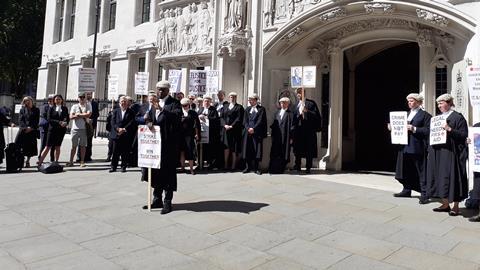Reporting on David Lammy’s race review of the criminal justice system in 2017, one particular finding stood out – black, Asian and ethnic minority defendants had so little faith in the criminal justice system that they did not even trust legal aid solicitors.
Trust wasn’t just low among defendants. Trust was low generally among the black, Asian and minority ethnic population, who thought the criminal justice system discriminates against particular groups and individuals.
This particular aspect of Lammy’s review came to mind whilst listening to 25 Bedford Row’s Leon-Nathan Lynch (pictured above) outside the Supreme Court yesterday, at the start of the third week of the criminal bar’s court walkouts over legal aid funding.
Lynch recalled walking down the stairs into the cells of a Crown court, where a young black man was sitting uninterested and didn’t even notice him walk in. ‘I sit down quietly and look at him. The reason I look at him is because part of me recognises and sees a young man that used to look like me, who dresses like me and who sounds like me.
‘As he looks up, we meet eyes. I almost see the shock on his face and I know what he’s going to say. He says “You look like me”. And I nod. It’s true. I take off my wig at this point. There’s no more formality needed. I tell him part of my story. I tell him I’ve been to this same Crown court before and I've watched many of my own friends come through this system. The reason I sit before him today is because I want to represent people who look like him and who look like me, from my community.’
Lynch has been fortunate to travel around the world and see many jurisdictions – Africa, the West Indies, South America, East Asia.
‘Without doubt, this is the best criminal justice system I have seen. When people speak of justice, they think about British courts. There is a sense of how things are done properly. You can be sure when you come to this country you should have a fair trial, you have the right to good legal representation... you will have a good lawyer to represent you.’
However, Lynch fears the UK has become complacent with its reputation. ‘Too long have we rested upon the fact that in this country we are respected, that we are looked at as a system that does things properly. And now our courts are falling to pieces, our barristers are leaving in droves, courts are collapsing, trials are collapsing, people aren’t being properly funded.
‘My concern is that I will not be able to walk into a court and sit down and represent people who look like me, traditionally from an over-policed community.’
Lynch’s concern is backed up by data.
According to the Bar Council, the number of barristers doing full time publicly funded criminal work was down more than 10% in 2020-21 from the previous year. The number of white barristers was down 10%. The number of black barristers was down 18%.
The Bellamy review stated that in 2019-20, there were 2,690 barristers doing mostly criminal work – only 70 were black, African or Caribbean.
Black people are overrepresented in the criminal justice system.
Government figures for 2020 showed that black people had the highest proportion of arrests that resulted from stop and search, driven by the overrepresentation of black people in the proportion of stop and searches that were conducted. Black defendants were more likely to be remanded in custody. A third of children in prison were black despite black prisoners accounting for only 13% of the entire prison population.
In the 2020/21 HM Inspectorate of Prisons Survey, higher proportions of white prisoners reported more positive experiences, including feeling respected by staff, compared to other ethnic groups.
The fight over legal aid funding is not just about ensuring legal aid lawyers are paid properly for the work they do. It is about ensuring criminal law is a career for people from all backgrounds. It is about ensuring a diverse pipeline to the judiciary, where only 1% of judges are black – a figure that hasn’t changed since 2014. It is about ensuring the criminal justice system reflects the society it serves.
This article is now closed for comment.





































1 Reader's comment